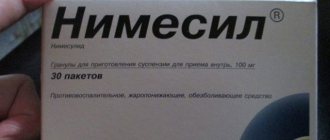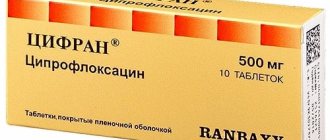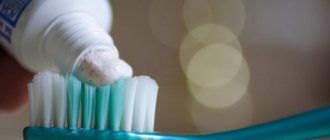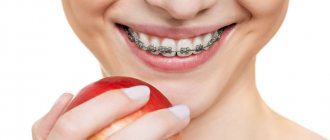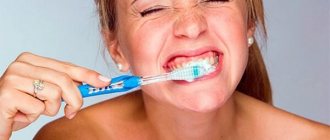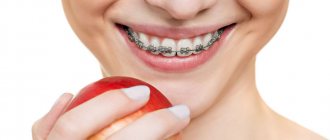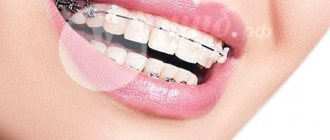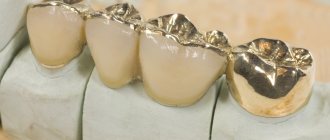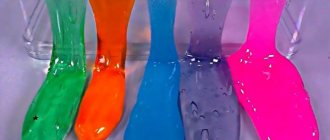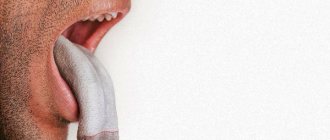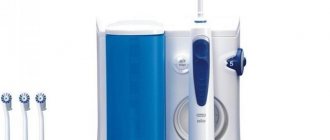Will it help?
Of course, before taking painkillers for a toothache, you should assess the degree of pain and think about the potential consequences of taking medications. In fact, according to statistics, very few people think about these aspects as soon as they experience pain in the oral cavity.
The most important fact is that relieving toothache with tablets will only be a temporary solution. This approach will help alleviate the general condition, but only for a certain time.
It should also be noted that tooth pain is often accompanied by concomitant symptoms, which manifest themselves in inflammation of the gums, cheek area, increased body temperature and a feeling of general malaise. Many of the tablets help relieve secondary manifestations, but have no effect on the cause.
This is why in most cases a visit to the dentist will still be required. After all, the painkiller will simply reduce the level of pain, but not for long. Moreover, in many situations the ongoing disease will only gain momentum and the pain will increase. Therefore, there is no point in enduring without visiting a doctor for a long period with persistent toothache.
Types of strong painkillers for tooth pain
For toothache, different types of painkillers can be used. Let's list:
- Tablets are used to influence the pain epicenter. They can dull the discomfort for several hours.
- The powder is gentle on the gastrointestinal tract and has anti-inflammatory and antipyretic effects.
- Toothpaste helps with increased sensitivity of tooth enamel. That is, if there is caries, pain relief will not occur. In the first case, it is enough to brush your teeth regularly.
- The gel is also able to temporarily relieve toothache due to its local anesthetic effect.
What to do if your tooth hurts: TOP 6 best painkillers for toothache
There are two groups of drugs that are best used to relieve toothache. These include: analgesics and NSAIDs (non-steroidal anti-inflammatory drugs).
Analgesics for toothache
These medications eliminate the source of pain by affecting the nerve endings and pain centers in the brain. However, analgesics, unlike NSAIDs, do not affect inflammatory processes and cannot eliminate inflammation of the pulp, periosteum, and gums.
Some drugs from this group, in addition to the analgesic effect, also have an antipyretic effect - they are called analgesics-antipyretics. Such medications can eliminate toothache and reduce the fever that accompanies it. Thus, analgesics-antipyretics help get rid of two unpleasant symptoms at once.
Paracetamol is considered the most popular and safe drug from this group.
Paracetamol
This medication has analgesic and antipyretic properties. It begins to act 30 minutes after administration, after the same time the maximum concentration of the active substance in the body is reached. Paracetamol can be used by children over 6 years of age (in tablet form, dosage 200 mg), adults, pregnant and lactating women.
The effect of the drug lasts 4 hours. This remedy can also be combined with other drugs to enhance their effectiveness. Paracetamol is quite safe, as it has a small list of side effects, and cases of their occurrence are recorded extremely rarely.
Contraindications for use:
- chronic alcoholism;
- serious liver disorders;
- hypersensitivity to paracetamol.
If you have a toothache and this causes your temperature to rise, then the safest thing to do is take a drug whose main active ingredient is paracetamol.
NSAIDs for toothache
Non-steroidal anti-inflammatory drugs suppress the production of prostaglandins (hormone-like substances that cause pain and inflammation in the body), resulting in reduced pain and inflammation. In addition, drugs from this group also have an antipyretic effect.
However, they cause a large list of side effects for the gastrointestinal tract and cardiovascular system. Therefore, they must be taken according to the instructions and prescription of the doctor. It is important to note that medical experts do not recommend taking non-steroidal anti-inflammatory drugs on an empty stomach, as this can lead to negative consequences.
There is a list of contraindications for which NSAIDs should not be taken:
- combined use with other drugs from the NSAID group;
- allergic reactions to the active and auxiliary substances of non-steroidal anti-inflammatory tablets for toothache, as well as powders, ointments and suspensions;
- severe renal, liver or heart failure;
- diseases of the gastrointestinal tract (ulcers, gastritis, Crohn's disease, ulcerative colitis) in the acute stage;
- previous heart surgeries and progressive diseases of the cardiovascular system;
- existing or recent internal bleeding;
- blood clotting disorders.
If you have a toothache and there are no contraindications listed above, then you can take an NSAID tablet.
The most effective painkillers for toothache from the group of non-steroidal anti-inflammatory drugs include: Nurofen, Nimesil, Ketanov, Dexalgin and Olfen.
Nurofen
Used to relieve mild to moderate toothache. The main active ingredient is ibuprofen, its maximum concentration in the blood plasma is reached after 45 minutes if taken on an empty stomach, or after 2 hours if taken on a full stomach.
After oral administration, ibuprofen is quickly absorbed and begins to relieve pain, relieve inflammation and reduce temperature. The half-life of the drug lasts 2 hours.
In addition to the standard contraindications for NSAIDs, ibuprofen should also not be used by women in the last trimester of pregnancy, as this can negatively affect the health of the baby.
Nurofen in tablet form for toothache can be taken by children over 6 years old if their body weight exceeds 20 kg.
To avoid negative reactions from the stomach and the entire gastrointestinal tract, it is recommended to take the drug after meals.
Ibuprofen tablets, which are film-coated, reduce the risk of side effects from the digestive system.
Nimesil
The main active ingredient of the drug is nimesulide. Nimesil is a light yellow powder that has a pronounced citrus smell.
When taken orally, nimesulide is quickly absorbed from the stomach and enters the bloodstream, and the maximum plasma concentration of 100 g of this active substance is achieved 2-3 hours after administration.
It is recommended to take Nimesil for toothache after meals. Nimesulide powder should be poured into a glass, pour 100 ml of water, stir and drink.
An additional contraindication to its use, in addition to the general contraindications for the NSAID group, is the combined use of nimesulide with analgesics and the presence of infectious fever.
It should not be taken by children under 12 years of age, pregnant or nursing mothers, or people with kidney or liver disease.
Ketanov
This drug is used against severe and moderate toothache. Its main active ingredient is ketorolac tromethamine. Ketanov is not addictive, and the strength of its analgesic effect is compared to morphine. This drug is much stronger and more effective than other members of the NSAID group.
Ketanov for toothache has an effect 60 minutes after a person takes the tablet, and the maximum effect of the drug appears after 2-3 hours.
The medication should be taken on a full stomach, because taking the painkiller on an empty stomach increases the risk of side effects. A few hours before and after taking Ketanov, it is recommended not to eat fatty foods, as it slows down the speed of its action.
It should be noted that the presence of urticaria, bronchial asthma, cerebrovascular bleeding and tonsillitis in a person is considered contraindications to the use of the drug.
Children are allowed to drink Ketanov for severe toothache only from the age of 16, and it is not prescribed to lactating women, pregnant women and people with chronic heart, kidney and liver diseases.
Dexalgin
The main component is dexketoprofen. Dexalgin relieves toothache 30 minutes after oral administration. The duration of the analgesic effect is 4-6 hours, and the duration of removal of the medication from the body is 1-3 hours.
Dexalgin is contraindicated for use in patients with bronchial asthma and hemorrhagic diathesis. In addition, it is strictly prohibited for children, women during lactation, pregnant women to drink it and should be taken with caution by people over 65 years of age. And patients who have problems with the kidneys and liver need to reduce its minimum dosage.
Dexalgin must be prescribed by a doctor, since this medicine, like all NSAID drugs, is available by prescription.
Olfen
The main active ingredient is diclofenac. It inhibits the biosynthesis of prostaglandins, thereby suppressing toothache and inflammation. It can also reduce elevated body temperature.
Contraindications to the use of Olfen are:
- cardiac ischemia;
- angina pectoris or previous myocardial infarction;
- peripheral artery disease;
- cerebrovascular pathologies.
The effect begins to appear 30 minutes after administration, and the maximum concentration in the blood occurs after 120 minutes.
Olfen is available by prescription after being prescribed by a doctor.
Let's go through the list
This material is not an advertisement for any products, so we will list the most suitable solutions in tablets for toothache in alphabetical order:
- Analgin.
- Ibuklin.
- Ketanov.
- Ketorol.
- Moment.
- Nise.
- Nimesil.
- Nurofen (ibuprofen and drugs identical to this group).
- Sanaprox.
- Tempalgin.
Ketanov is considered one of the most suitable options when asking what you can drink for toothache. It has a sufficient speed of impact, that is, fast, and at the same time effective. In some cases, such tablets help relieve even severe pain. But you should remember about the frequency of administration and dosages.
Nurofen not only helps relieve pain, but also has an anti-inflammatory and antipyretic effect on the entire body. You should be aware that some of the modifications of these toothache tablets contain a potent substance in the form of codeine. We are talking about variations of Nurofen Plus and Nurofen Plus N. It will also enhance the analgesic effect. The classic version can be used to relieve toothache in both adults and children.
A simple option with classic toothache tablets in the form of Analgin is also popular in the fight against this disease. The main substance here is sodium metamizole, which, due to its acidic structure, has a negative effect on enamel. For this reason, if there is damage in the latter, the area of carious lesions may increase. But if the filling falls out or is chipped, it will be effective.
Nurofen
Active ingredient: ibuprofen . Available in the form of tablets and gel. There are also syrup and suppositories for children. Has anti-inflammatory and analgesic effects. To a lesser extent, antipyretic effect is observed. The substance is absorbed into the body within 30-60 minutes . Penetrates into synovial tissue, but does not penetrate into the articular cavities. Most of it is excreted through the kidneys, the rest through the intestines.
The indications are:
- Joint diseases.
- Pain syndrome.
- Fever.
- Toothache, headache and migraine.
The gel is recommended for use for:
- Back pain.
- Myalgia and neuralgia.
- Injuries (bruises and sprains).
- Arthritis.
For children's syrups and suppositories, the indications are the same. In addition, children are allowed to use it for acute respiratory infections, flu, childhood infections and reactions to vaccinations.
Contraindications are:
- Ulcers in the gastrointestinal tract and bleeding.
- Heart failure.
- Hypertonic disease.
- Individual intolerance to the components of the drug.
- Liver and kidney disorders.
- Hemophilia.
- Intracranial hemorrhages.
- Pregnancy and lactation period.
Adults and children over 12 years of age are prescribed 1 tablet 3-4 times a day after meals. The gel is applied 4 times a day . Apply a thin layer to the affected area and rub well into the skin. The interval between applications should be at least 4 hours .
The dosage of syrup for children is calculated from the formula 5-10 ml per 1 kg of body weight . As an antipyretic, it is taken for no more than three days, and as an analgesic - no more than five. Suppositories are administered rectally, 3-4 times a day, one piece at a time .
About contraindications
Any doctor will tell you that any painkillers for toothache also have a negative effect on the body. This is due to the fact that they involve the functioning of the gastrointestinal tract, kidneys, liver, cardiac and nervous systems. But side effects are observed when pills and other types of drugs are taken incorrectly or when treatment regimens are not followed.
Main contraindications for toothache tablets:
- individual intolerance;
- pregnancy;
- lactation period;
- ulcer;
- heart failure;
- kidney or liver problems;
- asthma;
- problems with the circulatory system;
- childhood.
In fact, the body can react individually to the action of substances, so before taking any painkillers you should read the instructions, and, if possible, also consult a specialist.
Nise
The active substance is nimesulide . Available in the form of tablets and gel. It has anti-inflammatory, antipyretic and analgesic effects. The analgesic effect is observed 15 minutes after administration. The maximum concentration of the substance in the blood plasma is observed after 30 minutes.
The drug is able to inhibit the formation of enzymes that destroy cartilage tissue. It also reduces the release of histamine and eliminates bronchospasm. Therefore, it can be used for bronchial asthma.
The maximum concentration of the drug in the body is observed after 2 hours . Penetrates well into body tissues and fluids. When using the gel, the components penetrate well into muscle and joint tissue. It is found in the blood in small doses. A persistent therapeutic effect is observed after 4 weeks of regular use. Indications for use of tablets:
- Arthritis.
- Osteoarthritis.
- Osteochondrosis.
- Thrombophlebitis.
- Toothache and headache.
- Fever
Indications for use of the gel:
- Rheumatoid and psoriatic arthritis.
- Osteochondrosis.
- Lumbago syndrome.
- Bursitis.
- Sciatica.
- Sprains and bruises.
Contraindications are:
- Exacerbation of peptic ulcer disease.
- Allergic reaction to the components of the drug.
- Pregnancy and breastfeeding.
- Children under 12 years old.
- Liver and kidney failure.
It should be taken with caution in case of diabetes mellitus, hypertension and lupus erythematosus. After taking the pills, drowsiness , so you should refrain from driving.
Adults and children over 12 years of age are recommended to take 1 tablet 2 times a day. It is better to take before meals with water. If discomfort occurs, tablets are taken at the end of the meal. The maximum dose per day is 400 mg . If renal function is impaired, the dose is reduced. If, while taking the tablets, symptoms associated with liver dysfunction appear, the drug is discontinued. After two weeks of use, it is necessary to do a biochemical blood test to check liver function indicators.
The gel has a pronounced analgesic effect. It is applied to the painful area 2-3 times a day, in a thin layer, without rubbing. The amount of gel may vary depending on the size of the affected area. Do not apply under bandages or on areas with damaged skin.
